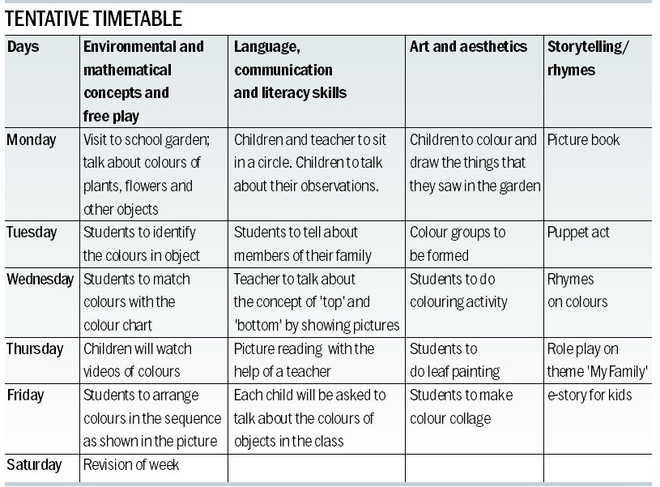SCERT suggests weekly plan for pre-school kids
Naina Mishra
Tribune News Service
Chandigarh, May 16
The State Council of Educational Research and Training (SCERT) have suggested a weekly plan for tiny tots with eight periods of 20 to 30 minutes under the ‘Pre-School Curriculum’.
The curriculum has been framed primarily from two documents of the NCERT — ‘The Preschool Curriculum’ and ‘The Preschool Guidelines’.
The timetable has been designed in a way that kids will learn environmental and mathematical concepts, language, communication and literacy skills, art and aesthetics, good-bye circle, storytelling/ rhymes.
The schedule is divided between teacher-initiated planned activities and child-initiated free play leading to self-paced learning. The first 30 minutes have been reserved for hygiene check-up and free conversation. The next 40 minutes have been dedicated to the environmental and mathematical concepts and free play.
Students will be made to recapitulate the day’s activities and will be encouraged to share the school experiences with their parents at home. A 30-minute slot has been reserved for outdoor activities which will include different games to be played by children through self-initiatives.
Last period (30 minutes again) has been reserved for key skills to be addressed to children, including vocabulary building, self-expression, number sense, sorting and matching, sequential thinking and classification.
Assessment of tiny tots
Children will be assessed on five parameters — ‘physical and motor development’, ‘sensory, perceptual and cognitive development’, ‘language, literacy and communication’, ‘personal, social and emotional development’ and ‘creativity’.
There is stern direct that no account, should children be made to take any form of test of examination — either oral or written. The purpose of evaluation at the pre-school stage is not to label a child as ‘pass’ or ‘fail’.
Assessment should focus on child’s strengths than deficits and will pave a way for learning new skills.
The teachers will grade students as either ‘need help’ or ‘performs well’.









